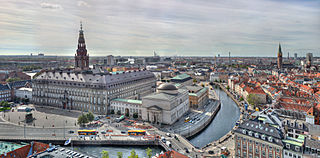
Copenhagen is the capital and most populous city of Denmark, with a population of 1.4 million in the urban area. The city is situated on the islands of Zealand and Amager, separated from Malmö, Sweden, by the Øresund strait. The Øresund Bridge connects the two cities by rail and road.
Medical tourism is the practice of traveling abroad to obtain medical treatment. In the past, this usually referred to those who traveled from less-developed countries to major medical centers in highly developed countries for treatment unavailable at home. However, in recent years it may equally refer to those from developed countries who travel to developing countries for lower-priced medical treatments. With differences between the medical agencies, such as the Food and Drug Administration (FDA) or the European Medicines Agency (EMA), etc., which decide whether a drug is approved in their country or region, or not, the motivation may be also for medical services unavailable or non-licensed in the home country.

Taipei Medical University in Taiwan is located in Taipei's Xinyi District. Founded as Taipei Medical College in 1960, it was renamed as Taipei Medical University in 2000. TMU has expanded into a university with ten colleges, 6,000 students per year, five hospitals, and more than 40,000 alumni around the world.
The Joint Commission is a United States-based nonprofit tax-exempt 501(c) organization that accredits more than 22,000 US health care organizations and programs. The international branch accredits medical services from around the world.
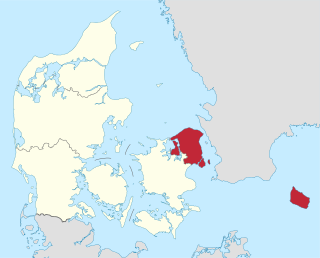
The Capital Region of Denmark is the easternmost administrative region of Denmark, and contains Copenhagen, the national capital.
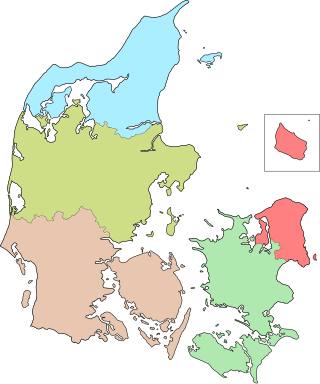
The five Regions of Denmark were created as administrative entities at a level above the municipalities and below the central government in the public sector as part of the 2007 Danish Municipal Reform, when the 13 counties (amter) were abolished. At the same time, the number of municipalities (kommuner) was cut from 270 to 98. The reform was approved and made into a law by the lawmakers in the Folketing 26 June 2005 with elections to the 98 municipalities and 5 regions being held Tuesday 15 November 2005.
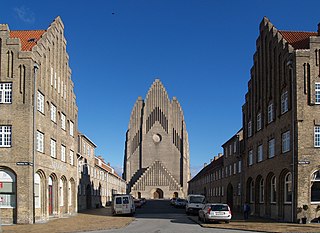
Bispebjerg, more commonly referred to as Nordvest , is one of the 10 official districts of Copenhagen Municipality, Denmark. Located on the northern border of the municipality, it covers an area of 5.39 km2 and a population of 40,033. More specifically, Bispebjerg refers to a smaller neighbourhood within the district, located on the Bispebjerg Hill from which it takes its name.
A patient safety organization (PSO) is a group, institution, or association that improves medical care by reducing medical errors. Common functions of patient safety organizations are data collection, analysis, reporting, education, funding, and advocacy. A PSO differs from a Federally designed Patient Safety Organization (PSO), which provides health care providers in the U.S. privilege and confidentiality protections for efforts to improve patient safety and the quality of patient care delivery
A catchment area in human geography, is the area from which a location, such as a city, service or institution, attracts a population that uses its services and economic opportunities. Catchment areas may be defined based on from where people are naturally drawn to a location or as established by governments or organizations such as education authorities or healthcare providers, for the provision of services.
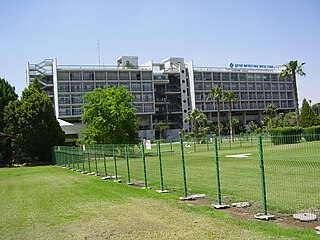
Soroka University Medical Center, a part of the Clalit Health Services Group, is the general hospital of Beersheba, Israel, it serves as the central hospital of the region and provides medical services to approximately one million residents of the South, from Kiryat Gat and Ashkelon to Eilat. Soroka has 1,191 hospital beds, and is spread over 291 dunams in the center of Beer-Sheva.
CapOpus is the name of a randomized controlled trial (RCT) running in Denmark at Psychiatric Center Bispebjerg and physically located at Bispebjerg Hospital in Copenhagen. It is an intervention aimed at reducing cannabis consumption in young persons with comorbid severe mental illness such as schizophrenia or schizotypal personality disorder, and cannabis dependency. It is run by psychiatrist Merete Nordentoft.
Due to the near-universal desire for safe, effective, and high quality healthcare, there is a growing interest in international healthcare accreditation. Providing healthcare, especially of an adequate standard, is a complex and challenging process. Healthcare is a vital and pervasive issue; it influences all aspects of societies. It has medical, social, political, ethical, business, and financial ramifications. In any part of the world healthcare services can be provided either by the public sector or by the private sector, or by a combination of the two. Healthcare can be provided in hospitals or be accessed through practitioners working in the community, such as general medical practitioners and dental surgeons.
Hospital accreditation has been defined as “A self-assessment and external peer assessment process used by health care organizations to accurately assess their level of performance in relation to established standards and to implement ways to continuously improve”. Critically, accreditation is not just about standard-setting: there are analytical, counseling and self-improvement dimensions to the process. There are parallel issues in evidence-based medicine, quality assurance and medical ethics, and the reduction of medical error is a key role of the accreditation process. Hospital accreditation is therefore one component in the maintenance of patient safety. However, there is limited and contested evidence supporting the effectiveness of accreditation programs.

Region Hovedstadens Psykiatri is a psychiatric hospital with centers spread all around the capital region of Denmark, mainly consisting of Copenhagen, northern Zealand, and Bornholm.

Bellevue Medical Center founded in July 2009, is a community hospital is located in Mansourieh, Lebanon. It offers healthcare services in many specialties. It has a capacity of 130 beds within its eight floors. Bellevue Medical Center is a Joint Commission International (JCI) accredited and Planetree Gold designated hospital.
Nordvest or The North West Block is an area in Denmark's Copenhagen municipality. It is located in the southwestern part of the Bispebjerg district. Although there are no clear borders nor any official demarcation, it is broadly recognized as the area covered mostly by the Danish postal code 2400 København NV, although some areas lie outside this postal code. As of 2005, 44,177 people resided in the area.
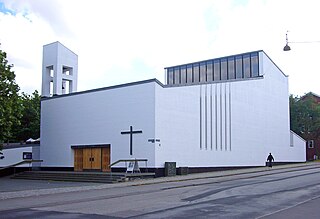
Utterslev is a neighbourhood in the Bispebjerg district of Copenhagen, Denmark. Utterslev is centered on Utterslev Torv and is most known for the Utterslev Mose marshland which straddles the border with Gladsaxe Municipality to the north.
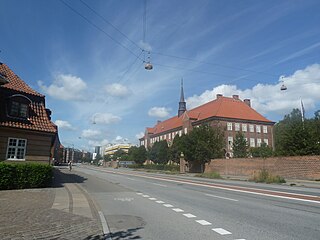
Tagensvej is a major street in the northwestern part of inner Copenhagen, Denmark. It runs from Blegdamsvej on the border between Nørrebro and Østerbro in the southeast to Frederiksborgvej and Bispebjerg Cemetery in the northwest.

Frederiksborgvej is a major street in the North-West, Bispebjerg and Emdrup neighbourhoods of Copenhagen, Denmark. The 3-kilometer street runs from Frederikssundsvej in the south to the municipal border with Gladsaxe Municipality in the north, where it splits into Søborg Hovedgade and Vangedevej.
St. Mark's Hospital is a 317-bed short-term acute care hospital located in Millcreek, Utah, in the United States. St. Mark's has provided medical services to Salt Lake Valley since its founding in 1872.
















